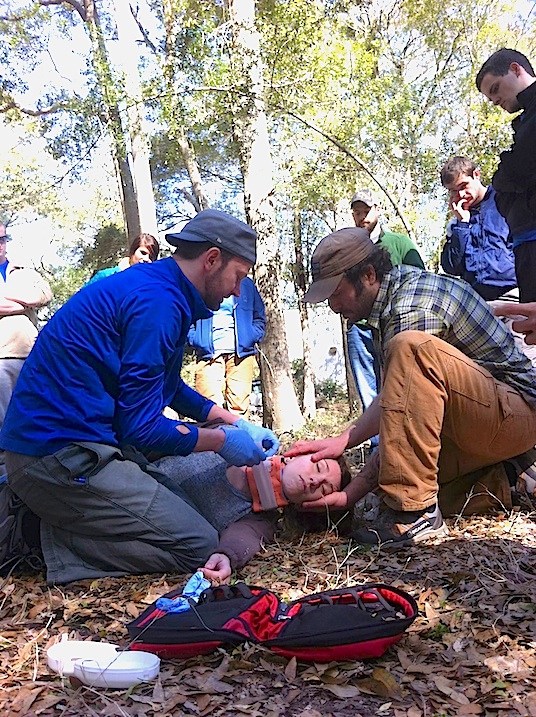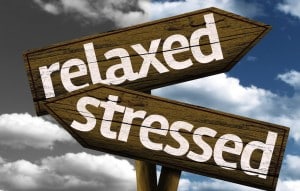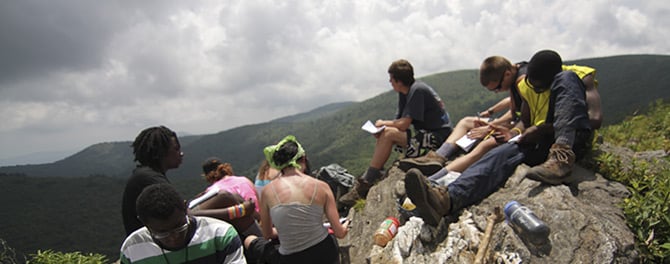The Importance Of Self At NCOAE
About NCOAEWe have a formula here at the National Center for Outdoor & Adventure Education (NCOAE) and it reads like this: Self + Community + Action = Impact.
In fact, self is the backbone of what we do at NCOAE. It involves our esteem, self-actualization and the decisions we choose to make — all of which are important because we strive to establish a strong sense of esteem in everyone who participates in one of our outdoor education courses.
No matter what the outdoor activity, we provide course participants with countless opportunities to build and reinforce self-confidence. Take backpacking, for example. Here is an opportunity to look back on the trail and say, “I did this. It is an enormous feat in autonomy.” The same holds true for course participants who navigate whitewater for the first time in a raft, or scale up a vertical rock face, or successfully tuck into a tight tube on a surfboard.
Any of these human-powered outdoor activities, when approached with confidence and a good attitude, can’t help but establish a strong sense of self. And getting to know yourself and your limits — actually understanding what it takes to battle through discomfort and arrive successfully at the other end — is a priceless commodity.
Going solo in the wilderness in a controlled scenario is another example that sets you up for successfully establishing a good relationship with yourself that can last a lifetime. Assisted by journal writings, Educational Groups and evening Process Groups, our course participants learn to (more…)
Outdoor Education News Roundup
Outdoor Education News The Outdoor Education industry is abuzz with news this time of the year. What with school almost back in session and the industry’s largest and most influential conferences coming up in just a few months, its no wonder there’s so much outdoor education news to catch up on.
The Outdoor Education industry is abuzz with news this time of the year. What with school almost back in session and the industry’s largest and most influential conferences coming up in just a few months, its no wonder there’s so much outdoor education news to catch up on.
In no particular order:
There’s a new trade magazine just for the college and university outdoor education industry. The inaugural issue of Outdoor Insider — published by The Association of Outdoor Recreation and Education (AORE) — is now available online without a subscription.
The 2nd edition of Administrative Practices of AEE Accredited Programs is now on sale for just $3.00. Published by the Association for Experiential Education (AEE), this book is an invaluable resource for any outdoor education program administrator. And at just $3.00, buying it now is a no brainer.
AEE is now accepting workshop proposals for its Symposium on Experiential Education in the Digital Age, which takes place in Boston, Mass. from May 2-3, 2015.
The latest issue (September 2014) of the Journal of Experiential Education is now available. Articles include:
- Effects of a Developmental Adventure on the Self-Esteem of College Students (This study examines the effects of outdoor developmental adventure programming (ODA) on college students’ self-esteem. Although some previous studies have shown that outdoor adventure programming has positive effects on self-esteem, others did not find any effect. A quasi-experimental study was conducted over 5 months, which included two pretests and two posttests to address some limitations of previous studies.)
- The Social Climate and Peer Interaction on Outdoor Courses (This two-study report investigates achievement goal theory in the social domain to gain greater understanding of how the social climate of outdoor courses relates to peer interactions.)
- Building a Community of Young Leaders: Experiential Learning in Jewish Social Justice (This study assesses whether more frequent participation in Jewish activist learning events is associated with higher levels of engagement in social justice-related activities and conceptions of Jewish identity. The study design was cross-sectional and comparative.)
- Case Study — Behavior Change After Adventure Education Courses: Do Work Colleagues Notice? (In this case study, a mixed-method approach is used to examine the extent and type of changes in workplace attitudes and behavior, as self-reported by soldiers who had participated in 6- to 10-day “Experiential Leadership Development Activities” (ELDAs) delivered by the New Zealand Army Leadership Centre.)
- Appreciative Inquiry and Autonomy-Supportive Classes in Business Education: A Semilongitudinal Study of AI in the Classroom (In this article, the authors describe 10 separate classroom experiences where an appreciative inquiry (AI) exercise was used for course creation. Post-exercise surveys of students showed that the AI exercise was perceived to be a successful practice.)
- Book Review: Adventures in Social Theory: An Introductory Guidebook
The Association for Experiential Education’s 42nd Annual International Conference is fast approaching. This year’s gathering of outdoor and adventure-based educators, academic and students takes place in Chattanooga, Tenn., Oct. 23-26.
The Association of Outdoor Recreation and Education is getting ready to host its (more…)
A More Convenient Way To Receive Wilderness First Responder Training
Wilderness First Responder Training It’s a well-known fact that one outdoor education industry standard for trip leaders, wilderness guides and backcountry educators who work on multi-day expeditions, is that you have to have a current and up-to-date Wilderness First Responder (WFR) training. How you satisfy that requirement is up to you.
It’s a well-known fact that one outdoor education industry standard for trip leaders, wilderness guides and backcountry educators who work on multi-day expeditions, is that you have to have a current and up-to-date Wilderness First Responder (WFR) training. How you satisfy that requirement is up to you.
Traditionally, the only way to earn the WFR credential was to enroll in an 80-hour course that took place over a one-and-a-half to two-week timeframe. That meant taking a leave from work, packing up your stuff, saying goodbye to your family, and driving to some random outdoor facility where you’d either camp or bunk with strangers for up to 14 days while you participated in the training. And while that format is still very popular and effective, a new approach for completing ‘woofer’ training has emerged, allowing those of us who aren’t able to commit up to two weeks away (from work and family) to receive the same training and certification.
It’s called a Wilderness First Responder & Wilderness EMT Hybrid/DLP Training (the DLP part stands for distance learning project), and it combines an approved at-home study and online testing component, followed by a four-night / five-day hands-on training here at The National Center for Outdoor & Adventure Education (NCOAE) in Wilmington, North Carolina.
This NCOAE-sponsored course exceeds the Wilderness First Responder & WEMT Scope of Practice requirements endorsed by the Wilderness Medical Society and is eligible for Fellow of the Academy of Wilderness Medicine credits from WMS!
With this approach to receiving your Wilderness First Responder certification, you complete 30-50 hours of home study, successfully past four tests administered online (which means you need a computer and reliable broadband/high speed Internet access), and then make your way to Wilmington for the short hands-on component. (more…)
Staff Profile: NCOAE EMS Program Coordinator and Instructor Donald Burns
Staff Profiles
Donald Burns of NCOAE
This time around in our continuing series of posts that reveal the people who work here at The National Center for Outdoor & Adventure Education (NCOAE), we’re pleased to introduce the guy who heads our emergency medical technician (EMT) program. Donald Burns coordinates our intensive 19-day EMT-Basic training schedule and everything else that has to do with equipping wilderness guides, outdoor educators, ambulance crew members, police officers, firemen, and even military specialists with the medical protocols required to help others in emergency medical situations.
Here’s Donald, in his own words:
NCOAE: Tell us about a time you realized you had the power to do something meaningful.
Donald: I would say my senior year in high school. We were working on an end-of-year project about what we were going to do for our career. At that time I was struggling with the idea that my basketball career was over so, I went to visit my uncle at the local fire station. After the first call I was determined to be a firefighter/ paramedic and help people during their time of need. As a result, I’m now able to help NCOAE deliver quality EMT training to an audience that’s determined to learn the same craft I fell in love with back in high school.
NCOAE: Who is your role model, and why?
Donald: To me, a role model has to demonstrate the following qualities:
- Clear set of values
- Passion and ability to inspire
- Commitment to community
- Selflessness
- Acceptance of others
- The ability to overcome obstacles
That being said, my role models would be my parents. They’ve stood by me during all my dreams — even they turned out to be disappointments. They are always proactive in the local VFW post, and when I was a kid they made sure that we always were able to play sports and take vacations — even if that meant them working two jobs. For that I thank them, and I am proud to have them as my role models.
NCOAE: What do you think about when you are alone on the trail?
Donald: Where am I and how to I get outta here. Just kidding! To me, that time is when I reflect on my life and think about where I want to go and how I will get there. That quiet time is my time to reflect and preplan. (more…)
Understanding the NCOAE Curriculum, Part 3
NCOAE CurriculumIt hasn’t been a speedy process but we continue be excited about the deep dive we’re offering up on the curriculum offered here at The National Center for Outdoor & Adventure Education (NCOAE).
As you might recall, our last blog post on this topic covered the educational group (Ed Group) topics of feelings identification, levels of communication/relationships and defense mechanisms. This time around we’re highlighting another batch of three Ed Group topics:
 Stress management
Stress management- Clear communication = conflict resolution
- Civic responsibility
Keep in mind that the big takeaway from all this curricula business, is not just to teach our students skills that enable them to become better climbers, hikers, surfers and rafters — but more important, to help them develop the ability to become better human beings and world citizens.
That’s why the NCOAE curriculum specifically deals with human skills. Because, let’s face it. Even on the trail, the honeymoon eventually comes to a screeching halt. And by honeymoon, we’re talking about those first few days of a wilderness excursion. We’re not going all Kumbaya on you, but that’s the time when everybody’s bubbly and happy and getting to know each other and enjoying the views. Problem is, group dynamics change — especially on an outdoor-based adventure.
And it’s most important that our course participants, whether they be preteens or upperclassmen, acquire the tools to deal with those dynamics when they emerge. Because they will emerge on both the trail and in the world from which they came.
So let’s start with our fourth Ed Group topic, stress management:
Outside of a traumatic event, stress usually builds up gradually, so when we arrive the point in an NCOAE course where expose participants to the stress management Ed Group, we ask them to describe personal situations where stress might have raised its ugly head. We ask them to tell us how they reacted — and dealt with stress in the past.
Then we conduct a few activities that offer participants a list of “triggers” and responses to those stresses. Students participate in a timed activity that (more…)
TALK TO US
Have any further questions about our courses, what you’ll learn, or what else to expect? Contact us, we’re here to help!
